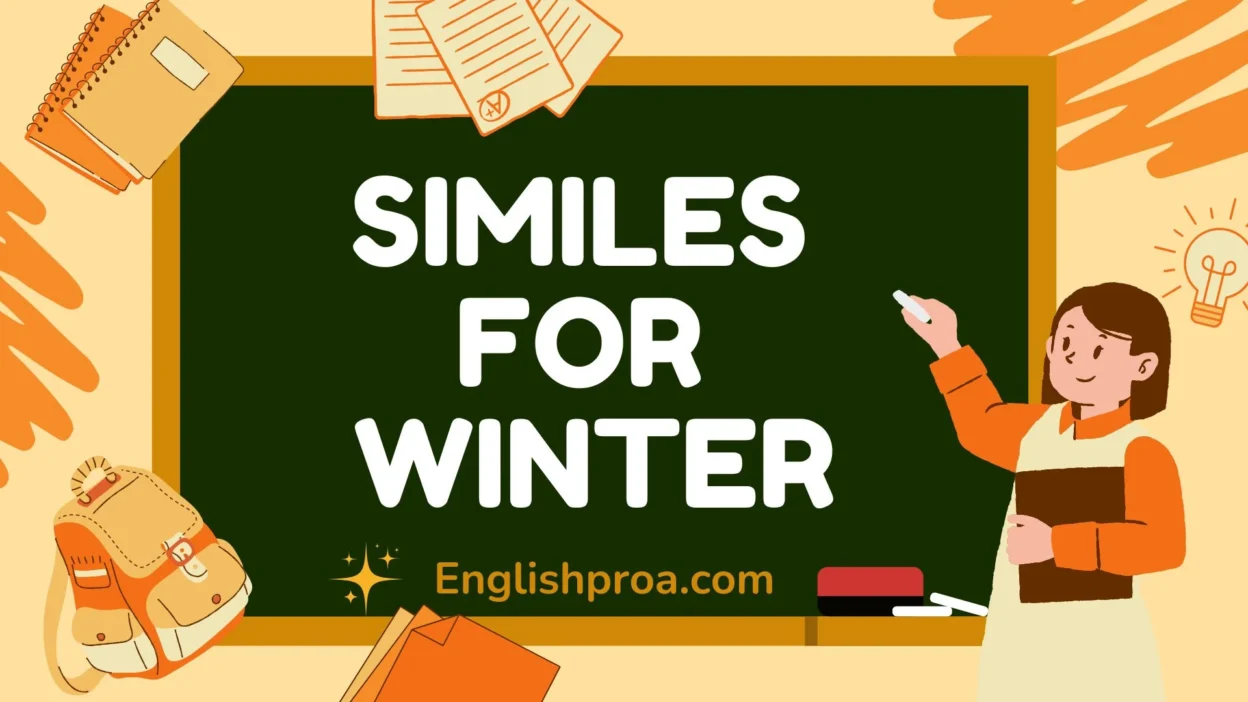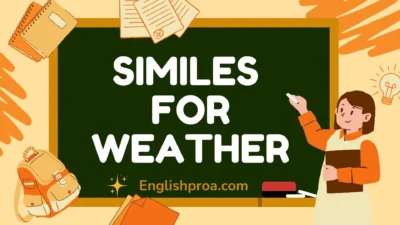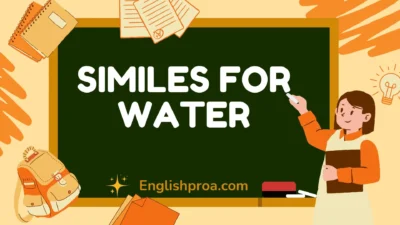Winter—just the word brings a flurry of images to mind: frosty mornings, cozy nights, and crisp air that bites gently at your nose. Whether you’re writing a heartfelt letter, crafting a seasonal poem, or simply trying to express how the cold season makes you feel, having the right words makes all the difference.
In this post, I’m sharing 30 thoughtful similes for winter that help you express the season with warmth, nostalgia, and creativity. I’ve used many of these myself while writing cards to loved ones or journaling during the colder months. They’ve helped me put into words those quiet moments when snow blankets the world and everything slows down. I hope they help you too.
Let’s dive into some of the best similes to describe winter—each one designed to touch the heart and elevate your writing.
Winter is like a quiet song
Meaning: Winter brings a peaceful, melodic calm.
In a sentence: The morning felt still, winter hanging in the air like a quiet song.
Best use: Reflective writing, poetry, or calm winter settings.
Not use: Action scenes or intense emotions.
Other ways to say: Winter is like a lullaby, Winter is like a whispered melody
Cold as a forgotten kiss
Meaning: The chill feels intimate and distant, like a memory.
In a sentence: The wind was cold as a forgotten kiss.
Best use: Nostalgic or romantic winter imagery.
Not use: Scientific or technical descriptions.
Other ways to say: Chilly as a faded memory, Icy as old love
Snowflakes like feathers drifting down
Meaning: Snow is soft, gentle, and graceful.
In a sentence: Snowflakes floated down like feathers from the sky.
Best use: Children’s stories, nature writing.
Not use: Heavy snowstorms or dangerous weather.
Other ways to say: Snow like lace, Snow like whispers from the sky
Frost like silver lace on glass
Meaning: Frost patterns resemble delicate, artistic designs.
In a sentence: Frost clung to the window like silver lace on glass.
Best use: Descriptive settings, nature metaphors.
Not use: Indoor heat or summer descriptions.
Other ways to say: Frost like spiderwebs, Frost like delicate embroidery
Winter air sharp as broken glass
Meaning: The cold is biting and intense.
In a sentence: The winter air was sharp as broken glass against her skin.
Best use: Describing bitter cold or discomfort.
Not use: Warm or cozy environments.
Other ways to say: Cold as steel, Air like icy needles
Snow-covered trees like sleeping giants
Meaning: Trees look large and peaceful under snow.
In a sentence: The trees stood silent, snow-covered like sleeping giants.
Best use: Nature imagery, fairy-tale settings.
Not use: Urban or fast-paced writing.
Other ways to say: Snowy trees like white statues, Branches like dreaming beasts
Icicles like crystal daggers
Meaning: Icicles are sharp and beautiful.
In a sentence: Icicles hung from the eaves like crystal daggers.
Best use: Dramatic winter scenes.
Not use: Light-hearted or humorous pieces.
Other ways to say: Icicles like frozen swords, Icicles like icy teeth
Wind howling like a lonely wolf
Meaning: The wind sounds wild and desolate.
In a sentence: The wind howled like a lonely wolf across the plains.
Best use: Evoking solitude or eerie silence.
Not use: Gentle winter settings.
Other ways to say: Wind like a wild animal, Wind like a ghost’s cry
Snow glistening like diamonds
Meaning: Snow sparkles beautifully under light.
In a sentence: The snow glistened like diamonds in the morning sun.
Best use: Describing magical or awe-inspiring scenes.
Not use: Dirty snow or melting piles.
Other ways to say: Snow like fairy dust, Snow like stars on the ground
Winter light pale as moon milk
Meaning: Winter light is soft, dim, and dreamy.
In a sentence: The sky was filled with winter light, pale as moon milk.
Best use: Poetic or gentle tone.
Not use: Bright or intense lighting descriptions.
Other ways to say: Light like parchment, Light like foggy glass
Snowdrifts like ocean waves
Meaning: Snow forms large, wave-like shapes.
In a sentence: Snowdrifts rose along the road like frozen ocean waves.
Best use: Descriptive or adventurous settings.
Not use: Flat snowy fields or minimalist imagery.
Other ways to say: Snow like rolling hills, Drifts like white dunes
Silence deep as a midnight lake
Meaning: Winter brings profound quiet.
In a sentence: The silence outside was deep as a midnight lake.
Best use: Calm or meditative writing.
Not use: Noisy environments or dialogue-heavy passages.
Other ways to say: Still as untouched snow, Quiet like a church at night
Branches like brittle bones
Meaning: Bare branches resemble fragile structures.
In a sentence: The trees reached out with branches like brittle bones.
Best use: Evocative or eerie settings.
Not use: Lush, leafy seasons.
Other ways to say: Twigs like skeletal fingers, Branches like old hands
Breath visible like a ghost
Meaning: Cold makes breath appear in the air.
In a sentence: Her breath curled in the air like a ghost.
Best use: Personal or moody winter moments.
Not use: Warm settings.
Other ways to say: Breath like fog, Breath like smoke signals
Snowfall soft as whispers
Meaning: Snow falls quietly and gently.
In a sentence: The snow fell soft as whispers through the trees.
Best use: Gentle imagery, children’s stories.
Not use: Harsh or violent weather.
Other ways to say: Snow like hush, Snow like a soft sigh
Morning light thin as a veil
Meaning: The light is dim and barely there.
In a sentence: The winter morning light was thin as a veil.
Best use: Moody or poetic tone.
Not use: Bright, cheerful scenes.
Other ways to say: Light like gauze, Sun like a distant echo
The chill like a steady drumbeat
Meaning: The cold is persistent and rhythmic.
In a sentence: The chill tapped at her skin like a steady drumbeat.
Best use: Continuous or long winter scenes.
Not use: Brief moments of cold.
Other ways to say: Cold like a rhythm, Cold like a ticking clock
Snowflakes like tiny sculptures
Meaning: Each snowflake is detailed and artistic.
In a sentence: He caught snowflakes like tiny sculptures on his glove.
Best use: Wonder-filled writing.
Not use: Heavy, clumped snow.
Other ways to say: Snowflakes like handmade art, Snow like frozen lace
Winter sky gray as steel wool
Meaning: The sky is overcast and dull.
In a sentence: The winter sky was gray as steel wool.
Best use: Describing cloudy or somber moods.
Not use: Sunny days or uplifting themes.
Other ways to say: Sky like slate, Sky like faded ink
The cold clung like wet clothes
Meaning: The chill feels heavy and intrusive.
In a sentence: The cold clung to her like wet clothes after rain.
Best use: Emphasizing discomfort.
Not use: Light or playful winter scenes.
Other ways to say: Cold like a second skin, Cold like icy tape
Snow like icing on a cake
Meaning: Snow lightly covers the land.
In a sentence: The rooftops were topped with snow like icing on a cake.
Best use: Whimsical or festive writing.
Not use: Harsh weather descriptions.
Other ways to say: Snow like frosting, Snow like powdered sugar
Winter nights dark as ink
Meaning: Nights are pitch black and deep.
In a sentence: Winter nights were dark as ink, silent and long.
Best use: Describing deep winter evenings.
Not use: Well-lit or city environments.
Other ways to say: Nights like velvet, Darkness like a closed book
Chill creeping like ivy
Meaning: Cold spreads slowly and persistently.
In a sentence: The chill crept up his spine like ivy.
Best use: Tense or suspenseful scenes.
Not use: Short bursts of cold.
Other ways to say: Cold like a shadow, Cold like spreading roots
Firelight warm as honey
Meaning: Firelight feels cozy and comforting.
In a sentence: The firelight was warm as honey on the skin.
Best use: Cozy or homey scenes.
Not use: Outdoor survival situations.
Other ways to say: Warm like tea, Fire like a gentle embrace
Snow crunching like stale bread
Meaning: The sound of walking on snow is dry and crisp.
In a sentence: His boots crunched the snow like stale bread.
Best use: Realistic or sensory writing.
Not use: Dreamy or soft imagery.
Other ways to say: Snow like crackers, Snow like dry leaves
Hats snug as a hug
Meaning: Winter clothes feel warm and comforting.
In a sentence: Her hat fit snug as a hug on her head.
Best use: Light-hearted or loving tones.
Not use: Harsh or serious writing.
Other ways to say: Scarf like a mother’s arms, Mittens like soft hands
Sleet like needles from the sky
Meaning: Sleet feels sharp and painful.
In a sentence: The sleet hit her face like needles from the sky.
Best use: Dramatic or intense scenes.
Not use: Peaceful snow settings.
Other ways to say: Rain like shards, Cold like broken glass
Windows frosted like sugared glass
Meaning: Frosted windows look decorative.
In a sentence: The windows were frosted like sugared glass.
Best use: Holiday writing or nostalgic settings.
Not use: Modern, industrial imagery.
Other ways to say: Glass like candy, Frost like sugar dust
Winter’s embrace like a quiet friend
Meaning: Winter can feel peaceful and welcome.
In a sentence: Winter wrapped around her like a quiet friend.
Best use: Reflective or peaceful pieces.
Not use: Negative or fearful perspectives.
Other ways to say: Winter like a calm hug, Cold like stillness
Snow piled like blankets on the earth
Meaning: Snow covers the land warmly and thickly.
In a sentence: The snow was piled like blankets on the earth.
Best use: Cozy, visual imagery.
Not use: Scenes of motion or urgency.
Other ways to say: Snow like quilts, Drifts like a nest
FAQs
1. Why use similes when writing about winter?
Similes add emotion and imagery, helping readers feel the season rather than just read about it.
2. How do I choose the right simile?
Pick similes that match the tone and emotion of your message—gentle, harsh, nostalgic, etc.
3. Can I use these similes in professional writing?
Yes, especially in creative writing, seasonal content, or thoughtful marketing materials.
4. Are similes good for kids’ writing too?
Absolutely! Similes like “snow like frosting” or “trees like sleeping giants” work wonderfully in children’s books or educational content.
5. How can I make my winter writing more expressive?
Use similes, sensory details, and emotional language to bring scenes to life.
Conclusion
Winter is more than just cold and snow—it’s a season rich with feeling, memory, and beauty. These 30 similes for winter are meant to help you express that magic, whether you’re a writer, teacher, or simply someone who loves to share their thoughts with depth and care.
I’ve found that similes like these make even the quietest snow day feel alive with meaning. Try a few in your next journal entry, card, or blog post—and let the season speak through you.





